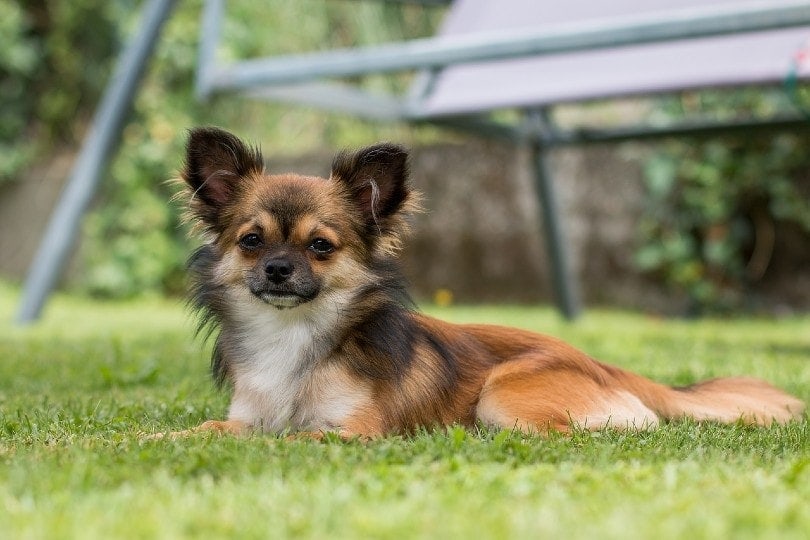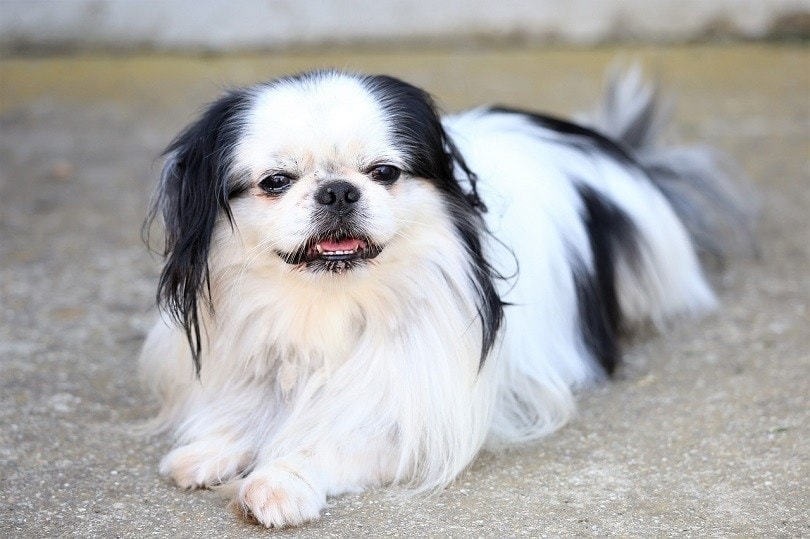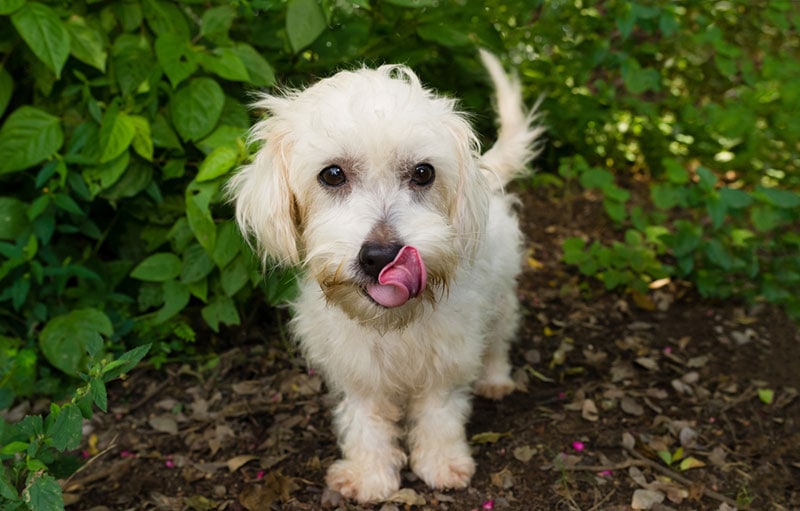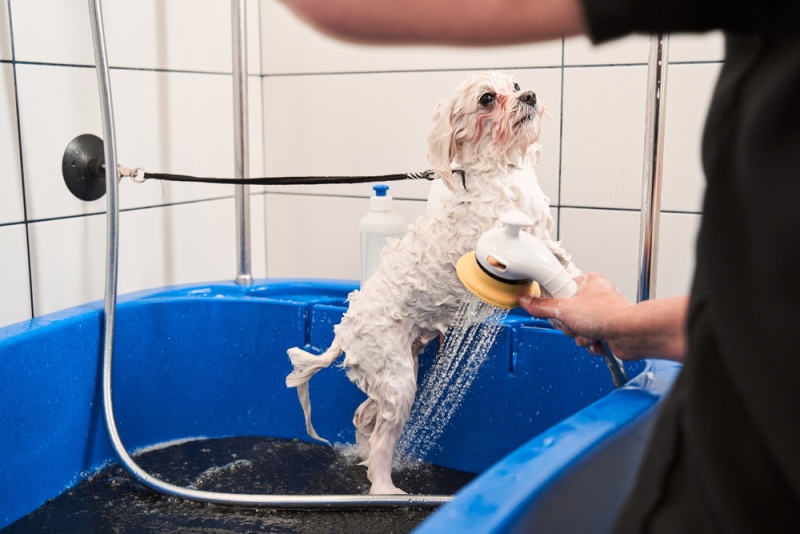8 Best Dog Breeds for Dementia Patients

Updated on

Having a pet has numerous benefits for mental, physical, and emotional health at any age, but it’s especially beneficial for older adults with dementia. In fact, pet ownership can provide dementia support by improving memory, especially for people who have owned pets throughout their lives, and can help with feelings of isolation, anxiety, stress, and depression.
While many different pets can help dementia patients, dogs are among the most popular pets for therapy and support. Here are the top 8 dog breeds for dementia patients.
The 8 Best Dog Breeds for Dementia Patients
1. Schnauzer

Schnauzers, whether miniature or standard, are a good choice for dementia patients. This breed originated from Germany and enjoys the company of people and other pets. These dogs are exceptionally friendly and affectionate, often happy to lay with their owners for hours on end. They do require regular grooming, but they’re not as high maintenance as some other breeds.
- Friendly
- Affectionate
- Sociable
- Moderate grooming needs
2. Shih Tzu

Shih Tzus were bred as companion dogs and enjoy life indoors. Originally bred for companionship in ancient China, Shih Tzus are small dogs with a long life expectancy and a strong attachment to their owners. Due to their size, Shih Tzus are ideal for apartments or single-room environments. Their coats are long and require some grooming, however.
- Ideal for small spaces
- Bred for companionship
- Loyal
- Moderate grooming needs
3. Pug

Originating in China, Pugs are a popular dog breed that works well for dementia patients. These dogs are small and well-suited for either homes or apartments and love to spend time with their owners. Their grooming needs are minimal, but they can be stubborn and headstrong. It’s important that they have strict boundaries and consistent training, so this is something to keep in mind.
- Suited for homes and apartments
- Minimal grooming needs
- Affectionate
- Can be stubborn
4. Chihuahua

Chihuahuas are a popular and well-known breed in standard and mini/teacup varieties. These dogs have big personalities and tend to be “one-person” dogs, making them ideal for a home with only one owner. Chihuahuas are social, but they can be active and energetic. A Chihuahua must get exercise and enrichment—if they become bored, they can be destructive or mischievous.
- Fiercely loyal
- Social
- Small
- Energetic; requires exercise
5. Cocker Spaniel

Cocker Spaniels are larger than the other dogs on this list, but they’re a popular option for a companion dog. This breed is generally easygoing and affectionate, which is beneficial for dementia patients. Several variations are available, including American Cocker Spaniels and English Cocker Spaniels. Most Cocker Spaniels have long coats and require regular grooming.
- Easygoing
- Affectionate
- Multiple varieties
- Medium-sized
- Moderate grooming needs
6. Boston Terrier

Known as the “American Gentleman,” the Boston Terrier is a small, non-sporting breed with a lively and affectionate nature. Boston Terriers enjoy households with children, making them a good choice for dementia patients with grandchildren. Due to their size and agreeable nature, Boston Terriers are often chosen for apartment living. They can be lively and energetic, however, which may be too much for a dementia patient.
- Suitable for apartments
- Good with children
- Agreeable
- Can be energetic
7. Rat Terrier

Rumored to be named by Teddy Roosevelt, the Rat Terrier is a small terrier that’s known for its ability to hunt rodents. Beyond exterminator abilities, Rat Terriers are loyal and cheerful dogs that enjoy spending time with their owners. Their coats are short and silky smooth, requiring little grooming. These dogs can be high-energy, however, so that’s something to keep in mind when choosing one for a small apartment or an owner with limited mobility.
- Small
- Good ratter
- Loyal and cheerful
- High energy
8. Japanese Chin

The Japanese Chin is a longtime companion of Japanese royalty. These dogs were bred specifically to be lap dogs, making them a good choice for dementia patients. They are sweet, faithful dogs and tend to get attached to their “one person.” They do have long, silky coats that require regular brushing, however.
- Faithful
- Companion dog
- Good-natured
- Moderate grooming needs
Considerations for Getting a Dog for a Dementia Patient
Though dogs are great for dementia patients, even small dogs require a lot of work and care. It’s important to balance the needs of the patient with the needs of the dog. Will the grooming be too much? Does the patient have limited mobility that affects play and exercise? Does the patient have a responsible adult family member to help with care?
It’s also important to keep in mind that some patients may see a pet as a source of annoyance or stress, even if they’ve owned pets their whole lives. Dementia takes a toll and often comes with personality changes, so be mindful of the needs of both the patient and the dog to make an informed decision.
If having a full-time pet isn’t an option, consider getting a foster dog or a dog brought for visits to boost the patient’s spirits. Another option is to bring in a pet therapy provider—these providers have dogs with experience and skills to support dementia patients, but they don’t require full-time care.
Conclusion
The companionship of dogs has been shown to have positive effects on dementia patients. Not every dog is suitable for every patient or circumstance, however. The dogs on this list are good choices for dementia patients for various reasons, but it’s important to consider the personality of both the dog and the patient before making a commitment.
See Also:
- Living With a Dog with Dementia: Vet-Reviewed Care Guide & FAQ
- Therapy Dog vs Emotional Support Dog vs Service Dog: Key Differences
Featured Image Credit: Budimir Jevtic, Shutterstock











